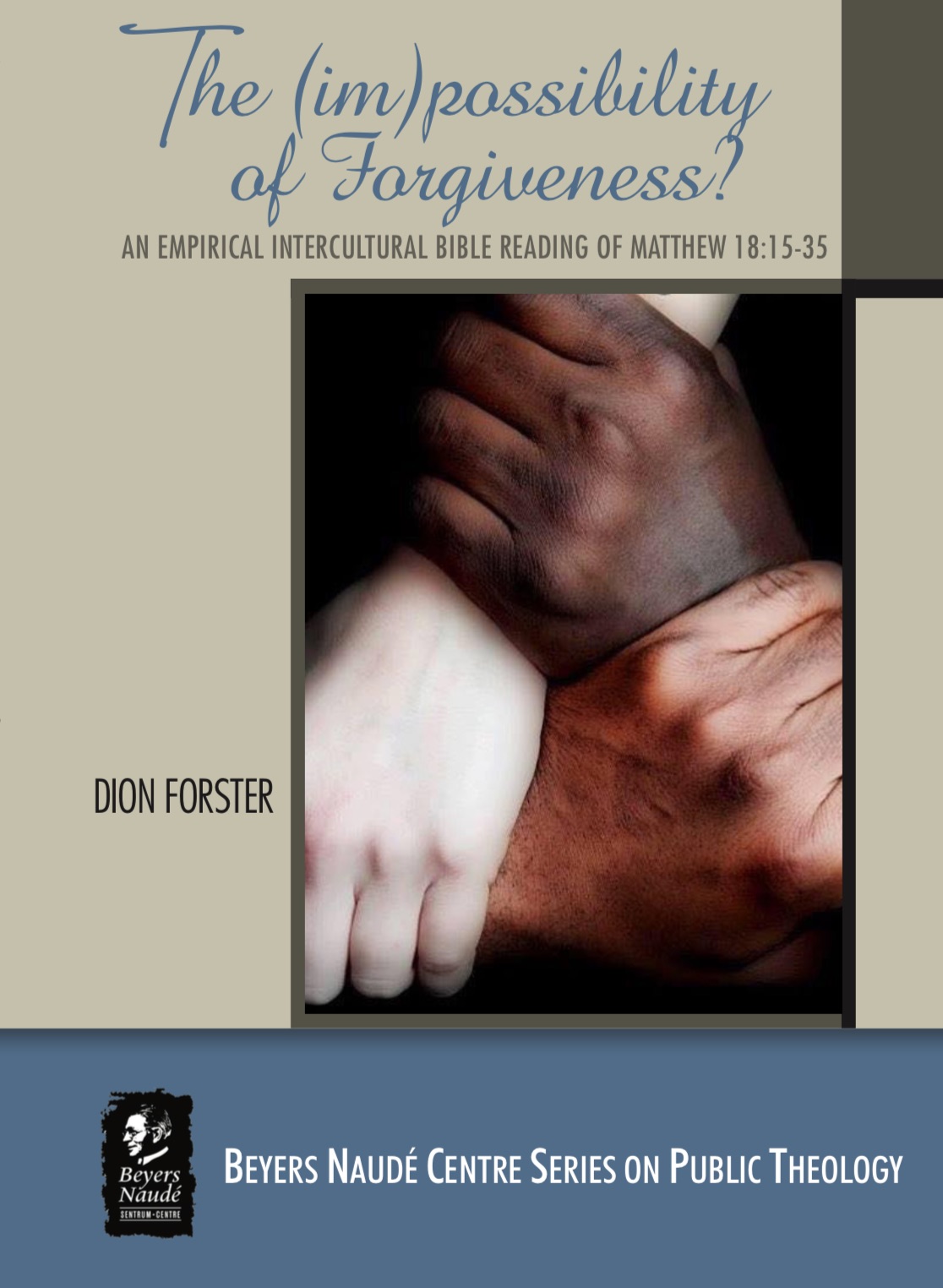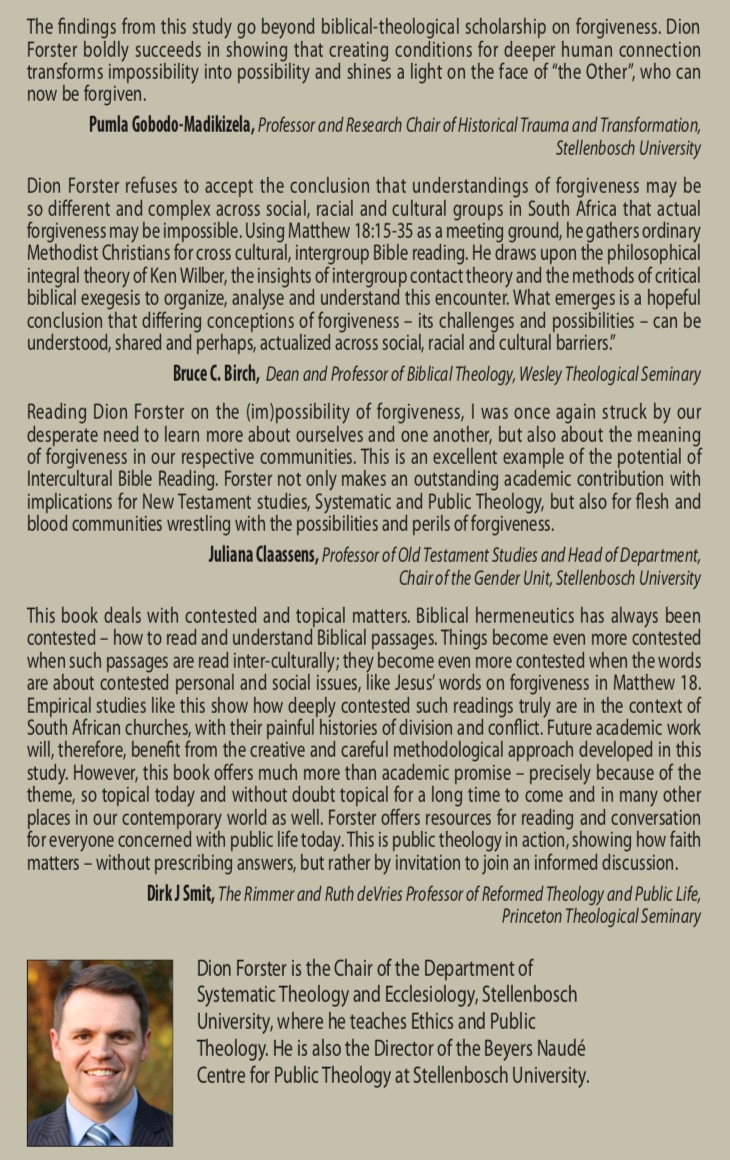Graduating with a 2nd PHD in Holland - the possibility of the (im)possibility of forgiveness!
 Friday, October 6, 2017 at 1:29PM
Friday, October 6, 2017 at 1:29PM  I am so grateful to be traveling to the Netherlands tomorrow (with my wife Megan!) to graduate with my 2nd PHD at Radboud University, Nijmegen in Holland.
I am so grateful to be traveling to the Netherlands tomorrow (with my wife Megan!) to graduate with my 2nd PHD at Radboud University, Nijmegen in Holland.
The graduation ceremony (and defence) will take place at 16.30 on Wednesday 11 October 2017 - if you read this beforehand you can watch the ceremony online via this link.
I started my research at Radboud University in December 2013. I worked on the project, and spent some wonderful months, at Radboud University between then and May 2017 when I completed the manuscript / dissertation. You can read all of my posts from Radboud and about this research (in reverse order!) via this link.
The research project is entitled:
The (im)possibility of forgiveness? An empirical intercultural Bible reading Matthew 18:15-39.(Click the title to read an excerpt from the book and see the table of contents).
In Holland it is required that the dissertation is published as a book. It has been published by African SUN Media in the Beyers Naudé Centre for Public Theology series on public theology.
Here is the full reference:
 You can read the abstract below, and see copies of the cover of the book and the commendations in the attached images. If you would like to purchase a copy you can do so via African SUN Media.
You can read the abstract below, and see copies of the cover of the book and the commendations in the attached images. If you would like to purchase a copy you can do so via African SUN Media.
I have some sections of the book under review for publication, and have already published the following article which is a shortened section of the Biblical exegetical component of the study:
I made one or two short videos of some of the central concepts (see the bottom of this post for a discussion of the empirical qualitative aspects of the study, and a discussion of one of the primary theoretical components).
I am truly grateful to my promoters, Prof dr dr Jan van der Watt and Prof dr Chris Hermans. They were encouraging, supportive, and wonderful guides along the journey. I learned so much and I am so grateful for the findings of the research and the fruit that it will bear for the participating communities.
Here is a video I recorded at my home University (Stellenbosch University) where I discuss how I worked with the participants to gather and analyse the theological (qualitative empirical) data on forgiveness.
In this video (recorded in Nijmegen at Radboud University) I discuss one of the primary theories that I used in the study, namely inter-group contact theory.
Here is the abstract from the dissertation:
This project engages the complexity of understandings of forgiveness in Matthew 18.15-35 within the context of an intercultural Bible reading process. The study shows that concepts of forgiveness among South African Bible readers are diverse, containing nuanced, and even conflicting, expressions and expectations - a politics of forgiveness. Some have suggested since such entrenched differences in understandings of forgiveness exist in South Africa, that forgiveness may be impossible. However, in spite of this complexity it is suggested that South Africans, and South Africa, could benefit from a rigorous academic engagement with the theologically and culturally diverse understandings of forgiveness that emerge from reading Matthew 18.15-35 in an intercultural Bible reading setting. The knowledge gained from this study may help persons from diverse histories, cultural identities, racial identities, and economic classes, to gain more integral, shared, understandings of forgiveness. In this sense, at least, the possibility of forgiveness may emerge.
Considering the above, the aim of this study is to produce rigorous, textured, and credible theological insight into the complexity of differing understandings of forgiveness in Matthew 18.15-35 from 'ordinary' Bible readers of different cultures who are members of the same Christian denomination - the Methodist Church of Southern Africa, Helderberg Circuit. This is achieved through structuring the study as a practice oriented research project in empirical intercultural Biblical hermeneutics.
Three theories informed the research design. First, Ken Wilber’s All Quadrants All Levels (AQAL) integral theory is used as a philosophical framework that provides language and structure to ‘plot’ the theological understandings of forgiveness in the text, and in the reading of the text. Second, intergroup contact theory is used to identify the mechanisms and processes for positive intergroup contact that inform the intercultural Bible reading sessions. Third, the Biblical text is engaged in a scholarly exegetical process so as to avoid collapsing the thought world of the text into the contemporary context. This is a critical aspect of a credible engagement with the Biblical text. This process allows for the construction of a hermeneutic bridge to link aspects of the text to aspects of the interpretive insights of the contemporary readers engaged in this study.
As anticipated, the findings of the research process agreed with some aspects of the research hypotheses and varied from others. The findings of the post intervention research data and analysis shows that to a large extent (except for minor variations which are discussed in the study) the participants of the intercultural Bible reading intervention developed more integral understandings of forgiveness. This means that participants were far more open to accepting understandings of forgiveness that were not held within their in-group, but were more common among members of the out-group.
The primary conclusion of this study is that more integral theological understandings of forgiveness are evidenced among the majority participants in this intercultural Bible reading process which was conducted under the conditions of positive intergroup contact. Moreover, this study shows that one can give credible empirical content to, and explicate, the theological perspectives, and the hermeneutic informants, of readers of the Biblical text. This helps the ‘problem owner’, (i.e., the Methodist Church of Southern Africa, Helderberg Circuit), to understand what some of the barriers to shared understandings of forgiveness may be. Moreover, it allows for the design of intercultural Bible reading interventions under the conditions of positive intergroup contact. The data shows that in this case, the participants of this study mostly became more open to a more integral theological understanding of forgiveness with the ‘other’.
This project makes the following novel contributions to scholarly knowledge and the construction of theory: In New Testament studies the research contributes towards a number of new hermeneutic opportunities that arise from reading the Biblical text from a social identity complexity perspective (informed by Ken Wilber’s integral AQAL theory). Moreover, in relation to intercultural Bible reading, the project provides new insights into how persons who hold different socially informed views of forgiveness may encounter one another constructively under the conditions of positive intergroup contact. In terms of empirical cultural Biblical hermeneutics this study is the first of its kind to provide insights into how Black and White South African Christians understand the concepts and processes of forgiveness in relation to Matthew 18.15-35. The findings show that there is a logic behind the socially informed theological understandings of forgiveness that are expressed by the participants. This holds value not only for Biblical Studies, but also for Systematic Theology in general, and South African Public Theology in particular. Then, from a methodological point of view, the interdisciplinarity of the theoretical approach that is employed in this research stimulates new avenues for scholarly theological study in relation to problems in practice.
Thanks for checking in and sharing in my joy! I appreciate it.



Reader Comments